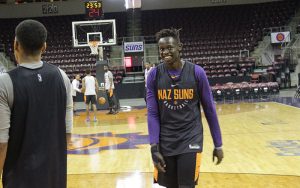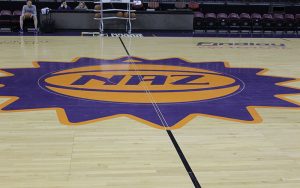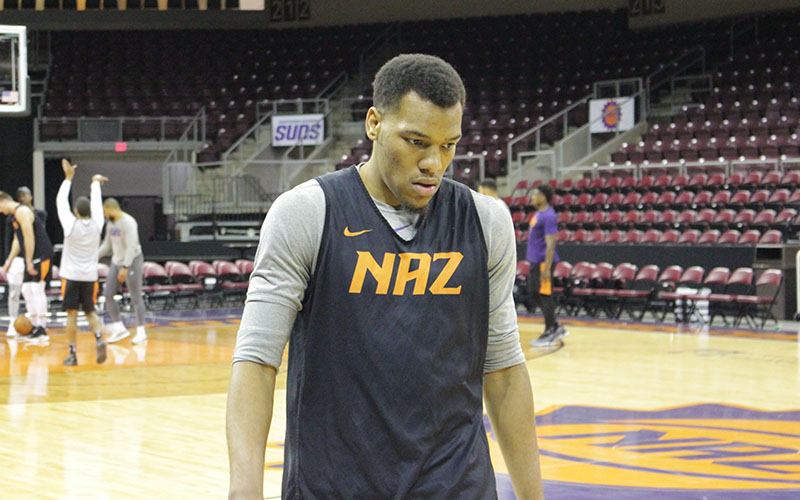PRESCOTT VALLEY – Life in the G League can feel as if it is the farthest thing from professional basketball. Teams play in small gyms in front of sparse crowds in cities without international airports.
The NBA’s official minor league has a Middle America, small-town feel far away from the NBA and its mega stadiums.
But for players clinging to an NBA dream, the G League is a place they can keep it alive.
For a former four-year collegiate player like George King, a former Colorado standout who now plays forward for the Northern Arizona Suns, playing in a small town like Prescott Valley can be ideal.
“It’s not hard to focus on basketball, to say the least,” King said in front of a media contingent of two, far fewer than the typical media scrum that greets Phoenix Suns players at Talking Stick Resort Arena about 90 miles south of the 5,100-seat Findlay Toyota Center where the NAZ Suns play.
Players like King, who was a late second-round draft pick of the parent Suns last summer, often are signed to two-way contracts that were introduced last season. The contracts expanded NBA rosters to 17 players and allowed teams to stash two players with their G League affiliate, where they can get valuable playing time and develop their games.
King and former Oklahoma State point guard Jawun Evans fill this role for the Suns. Because they’re always on call with the Phoenix Suns, they have learned how to always be ready should they be needed for practice or a game.
Evans has been with the organization since early December after playing 48 games with the Los Angeles Clippers in 2017-18.
He and King are roommates on NAZ Suns road trips, and all of the players are neighbors in apartments provided in Prescott Valley by the parent club.

Northern Arizona Suns player Peter Jok made his professional debut with the Phoenix Suns in 2017. (Photo by Alec Henden/Cronkite News)
King and Evans are learning how to best help each other, which can mean always having the necessary equipment ready to go. If they’re not on a road trip, two-way players often are driven to Phoenix for Suns home games in case they’re needed. They might get the call on a road trip, too, if the big club has a player who is unavailable.
It requires patience. King has been active for the Phoenix Suns for three games this season. He has played in only one, when he made his NBA debut in December at San Antonio, where he went to high school. Evans has been active for 12 games and played in five.
“There’s times when I show up to games with the (Phoenix) Suns with my basketball shoes, and I had my blazer because I wasn’t sure if I was active or inactive,” King said. “You prepare yourself to play. That way, you’re mentally ready.”
Evans experienced how quickly things can change for a G League player recently when rookie Phoenix point guard De’Anthony Melton, who also has spent time in the G League this season, suffered an ankle injury against the Portland Trail Blazers on Jan. 24.
The Suns were down a guard with a three-game road beginning in Denver the next night. Evans was with NAZ on a road trip when the call came. Evans already had his bags packed.
“I was in Oklahoma City not knowing I was going to get called up the next day,” said Evans. “It’s challenging, it goes with the game so you never really know what is going on.”
The challenges off the court seem small compared to the challenges of learning different sets of plays and how to work with two different sets of teammates. The NBA team and its G League affiliate work together to make the process as easy as possible.
“The one thing that I try to do is keeping our system as similar to Phoenix’s as possible,” said NAZ Suns coach Bret Burchard. “So when they go back and forth, it’s not like they’re learning a whole new system. They can assimilate right into what Phoenix is doing and contribute right away.”
Both players appreciate the effort that those in the organization do to make things easier for them. Because of the new nature of the two-way contract, there aren’t too many other professional basketball players that King and Evans can turn to for advice.
King reached out to Denver Nuggets players Torrey Craig and Monte Morris after he inked his deal with the Suns. Both Craig and Morris played under two-way contracts last season, and shared their knowledge to help King to adjust the constant uncertainty that comes with the job.
“I was just picking those guys brains and asking them how it’s like on and off the court,” King said. “They shared some funny stories and some tough times. I kind of braced myself for those experiences that they had the year before.”
The challenge can be worth it.
The two-way contracts are a big improvement over regular G League contracts. Two-way players are guaranteed at least $77,250, even if they strictly play in the G League. They can earn up to $204,000 in a season if they spend the maximum of 45 days on the NBA roster allowed by the contracts. And if a two-way player achieves all of the incentives allowed, he can earn as much as $506,215 for a season.
That is quite a pay raise from the standard $35,000 salary G League players receive, according to Forbes.
NBA commissioner Adam Silver has made the G League a priority, and by creating the two-way contract, more opportunities are available to allow players to develop without going overseas. It also allows the NBA to operate a true minor league system similar to those of the NHL and MLB.

The logo of the Northern Arizona Suns is painted on the floor of the Findlay Toyota Center in Prescott Valley. (Photo by Alec Henden/Cronkite News)
Dylan DeBusk, interim general manager of the NAZ Suns, has been with the organization through its first three years in Prescott Valley. He’s seen the benefit of two-way contracts for players and basketball organizations.
“I think two-ways help teams keep talent in the states,” DeBusk said. “There is a robust European market, and a lot of the two-way players are high level college guys that graduated, or some of them are returners from Europe. So having that carrot of the two-way contract benefits the league in keeping the talent in the NBA and the G League.”
The Suns have been active in finding players for the two-way role. Last season they signed guard Mike James to a fully-guaranteed NBA contract after he exceeded expectations in the G League on a two-way deal. Other players who’ve earned fully-guaranteed NBA contracts include Quinn Cook, who is with the Golden State Warriors, and Allonzo Trier of the New York Knicks.
There are now 27 G League teams affiliated with NBA clubs this season, each playing a 50-game schedule. A 28th team, which will be affiliated with the New Orleans Pelicans, will debut next season.
At the beginning of this season, 40-percent of the NBA’s 494 opening-day players had some experience in the G League or its predecessor, the NBA D League.
“It’s definitely a great opportunity, especially for college players who were fringe guys,” King said. “I’m getting better, faster here in the G League playing night in and night out rather than sitting on the bench.”
Follow us on Twitter.
